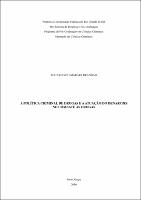| Share record |


|
Please use this identifier to cite or link to this item:
https://tede2.pucrs.br/tede2/handle/tede/6954Full metadata record
| DC Field | Value | Language |
|---|---|---|
| dc.creator | Brandão, Eduardo Guimarães | - |
| dc.creator.Lattes | http://buscatextual.cnpq.br/buscatextual/visualizacv.do?id=K4350428P0 | por |
| dc.contributor.advisor1 | Souza Júnior, Ney Fayet de | - |
| dc.contributor.advisor1Lattes | http://buscatextual.cnpq.br/buscatextual/visualizacv.do?id=K4771413T1 | por |
| dc.date.accessioned | 2016-09-12T16:27:41Z | - |
| dc.date.issued | 2016-03-31 | - |
| dc.identifier.uri | http://tede2.pucrs.br/tede2/handle/tede/6954 | - |
| dc.description.resumo | O presente trabalho tem como escopo a análise da política criminal antidrogas e suas consequências produzidas. Seu objetivo foi o estudo das formas de atuação da polícia na implementação dessa política, a identificação dos sujeitos envolvidos e os resultados produzidos. Para tanto, realizou-se uma análise cronológica da implementação da política de guerra às drogas ao longo do tempo, objetivando refletir sobre as razões do seu surgimento. Em um segundo momento, buscou-se estudar as consequências geradas em razão da proibição das drogas, analisando-se os impactos a partir da pretensa intenção legislativa de, com a criminalização, reduzir o consumo de determinadas substâncias e a violência. A principal virtude deste estudo foi a pesquisa de campo realizada no Departamento Estadual de Investigações do Narcotráfico (DENARC/RS) da polícia civil gaúcha, no qual foram analisados inquéritos policiais que continham autos de prisão em flagrante e termos circunstanciados, além de observadas as práticas e discursos produzidos pelos agentes de segurança para se entender quais as dinâmicas e motivações das suas ações, quem são os sujeitos incriminados, quais são a natureza e a quantidade das substâncias e objetos apreendidos e, por fim, se existem e quais são os critérios que pautam os enquadramentos típicos por tráfico e consumo de entorpecentes. | por |
| dc.description.abstract | This study aims to analyze the drug policy and its consequences produced in combating the trade in illicit substances, mainly in the form of police action. Therefore, the aim of this study was the analysis of the forms of police action in the implementation of this policy, the identification of the subjects involved and the results produced by the police action with regard to made seizures and incriminated individuals. For this the research was divided into two chapters. At first chapter, there was a chronological review of the implementation of the criminal policy of drug over time in order to reflect on the reasons for its emergence. Also, we attempted to study the consequences generated because of criminal drug policy, analyzing the impacts from the alleged legislative intent, the outlawry, reduce the consumption of certain substances and violence. In the second chapter presents the field research conducted in the State Department of Narcotics Investigations (DENARC / RS) of the state civil police. We analyzed police investigations containing arrest records in the act and detailed terms. In addition to observing the practices and discourses produced by security agents to understand what the dynamics and motivations of their actions, who are incriminated subject, what are the nature and quantity of seized substances and objects, and finally, if there are and what are the criteria that guide the typical frameworks for trafficking and consumption of drugs. Thus, it was possible to realize the fragility of police action, manifested in superficiality of investigations In addition, there was little impact produced by the police actions in the traffic market that, in addition to small seizures made, occur - invariably - in the same places, vulnerable urban areas, reaching thus always the same social class individuals more low, with little study and people with police records, regardless of the amount of seized substances. | eng |
| dc.description.provenance | Submitted by Setor de Tratamento da Informação - BC/PUCRS ([email protected]) on 2016-09-12T16:27:41Z No. of bitstreams: 1 DIS_EDUARDO_GUIMARAES_BRANDAO_PARCIAL.pdf: 313185 bytes, checksum: b9046d6072ec1e11c7a8b1f25298be2a (MD5) | eng |
| dc.description.provenance | Made available in DSpace on 2016-09-12T16:27:41Z (GMT). No. of bitstreams: 1 DIS_EDUARDO_GUIMARAES_BRANDAO_PARCIAL.pdf: 313185 bytes, checksum: b9046d6072ec1e11c7a8b1f25298be2a (MD5) Previous issue date: 2016-03-31 | eng |
| dc.format | application/pdf | * |
| dc.thumbnail.url | http://tede2.pucrs.br:80/tede2/retrieve/166236/DIS_EDUARDO_GUIMARAES_BRANDAO_PARCIAL.pdf.jpg | * |
| dc.language | por | por |
| dc.publisher | Pontifícia Universidade Católica do Rio Grande do Sul | por |
| dc.publisher.department | Faculdade de Direito | por |
| dc.publisher.country | Brasil | por |
| dc.publisher.initials | PUCRS | por |
| dc.publisher.program | Programa de Pós-Graduação em Ciências Criminais | por |
| dc.rights | Acesso Aberto | por |
| dc.subject | POLÍTICA CRIMINAL | por |
| dc.subject | SEGURANÇA PÚBLICA | por |
| dc.subject | POLÍCIA CIVIL - RIO GRANDE DO SUL | por |
| dc.subject | CRIMINOLOGIA | por |
| dc.subject | DIREITO | por |
| dc.subject.cnpq | CIENCIAS SOCIAIS APLICADAS::DIREITO | por |
| dc.title | A política criminal de drogas e a atuação do DENARC/RS no combate às drogas | por |
| dc.type | Dissertação | por |
| Appears in Collections: | Programa de Pós-Graduação em Ciências Criminais | |
Files in This Item:
| File | Description | Size | Format | |
|---|---|---|---|---|
| DIS_EDUARDO_GUIMARAES_BRANDAO_PARCIAL.pdf | Texto Parcial | 305.84 kB | Adobe PDF |  Download/Open Preview |
Items in DSpace are protected by copyright, with all rights reserved, unless otherwise indicated.




